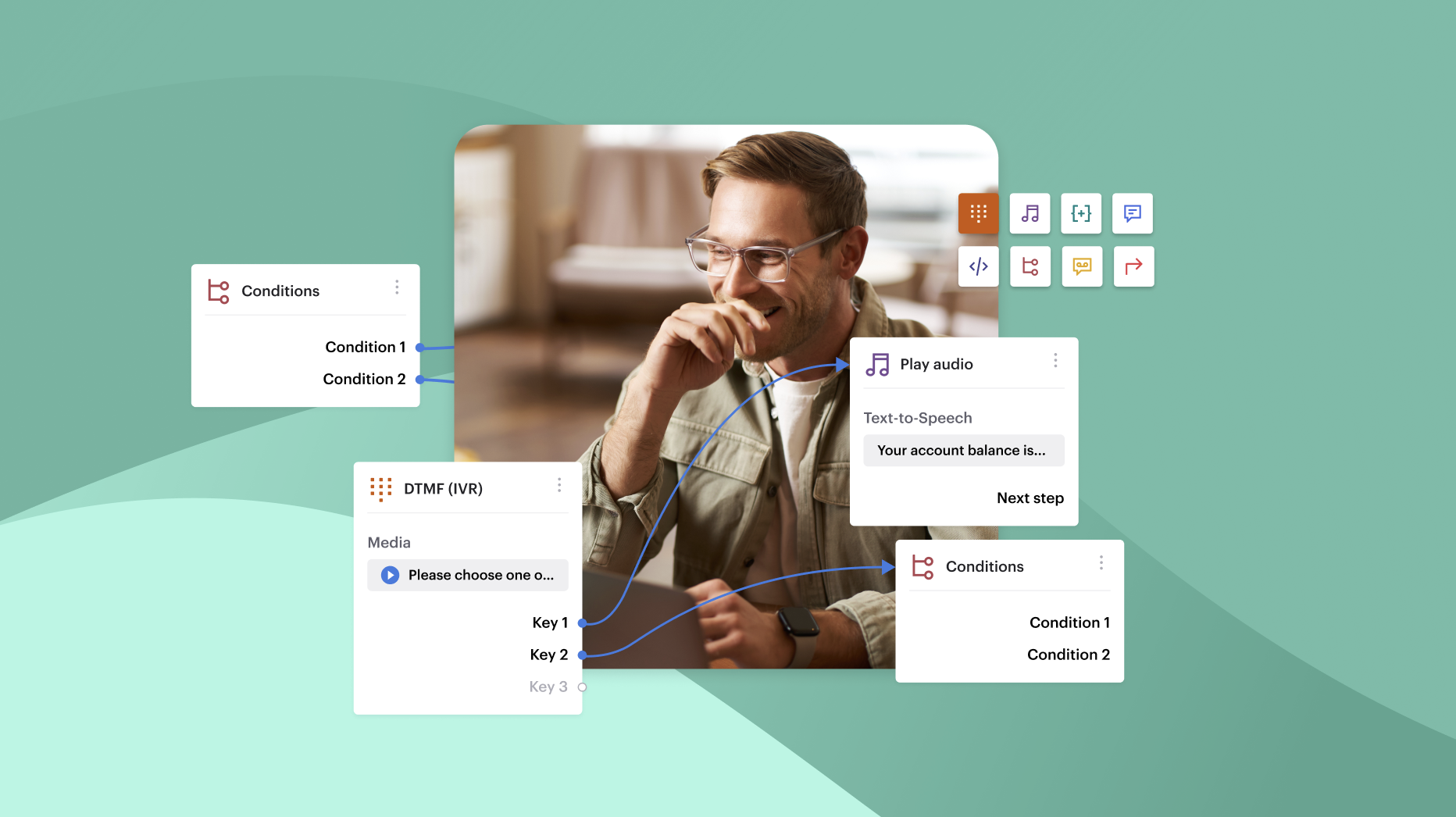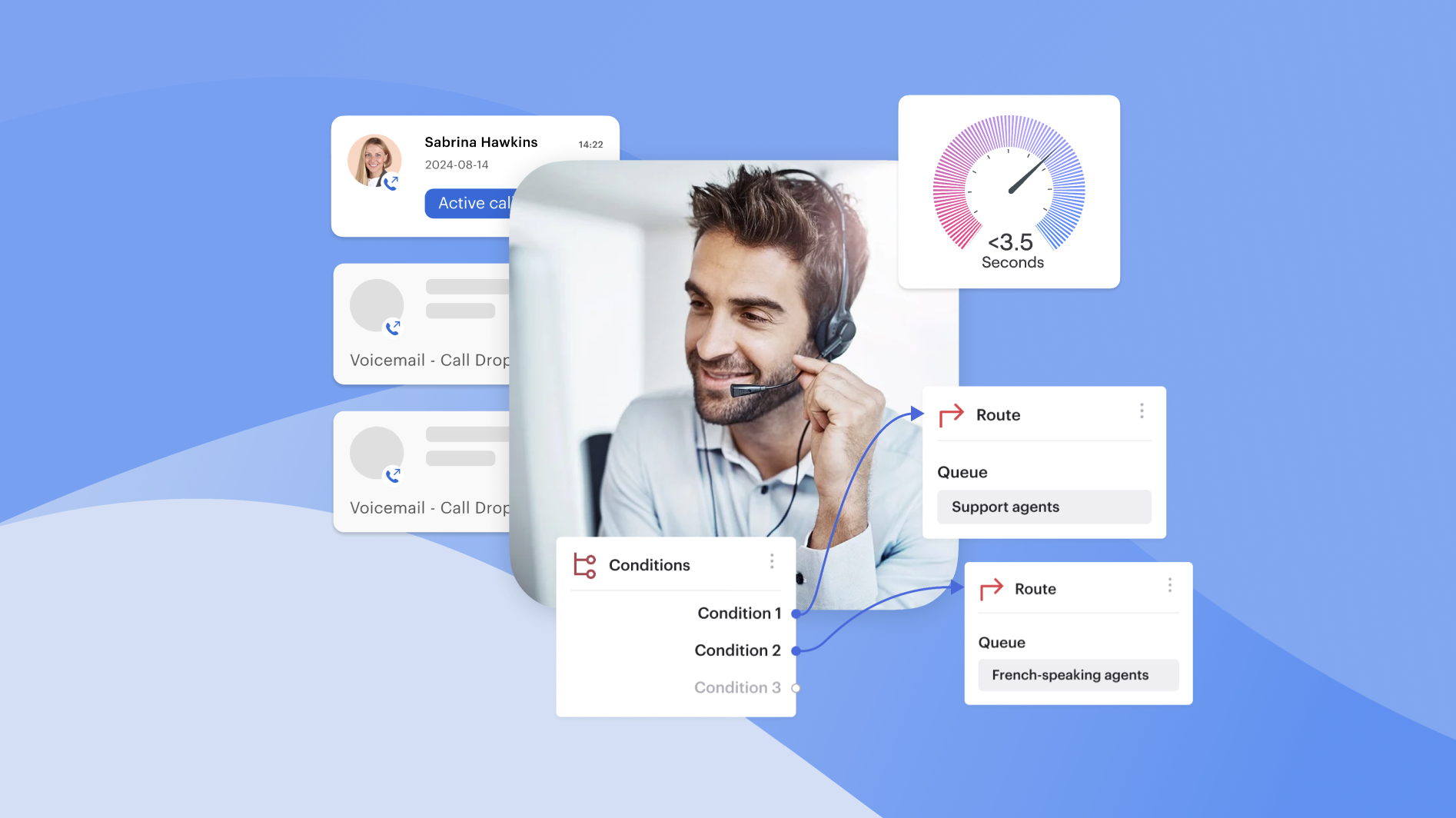Finding the right tools to streamline communication and decrease response times, all while improving CX may seem like a feat to accomplish. But many tools have evolved from simple help desks into comprehensive customer service powerhouses.
They’re capable of integrating with multiple channels to support team collaboration, and automating mundane tasks so agents are free to handle what matters. Plus, they ensure no customer request goes unanswered.
But knowing where to start can be a challenge for many businesses looking into customer support platforms for the first time. That’s why we’ve covered all the essential features to consider when choosing the right tool for your company.
Key Takeaways
- Scalability: Choose tools that grow with your business, offer tiered pricing, cloud access, multilingual support, and customizable workflows to maintain consistent service quality.
- Multi-Channel Support: Platforms should centralize email, chat, phone, social media, and messaging apps, enabling agents to manage all customer interactions from a single interface.
- Automation: AI-powered chatbots, automated ticket routing, auto-responses, and SLA alerts reduce manual workload, speeding up resolutions and improving customer satisfaction.
- Knowledge Management: Self-service options like knowledge bases, FAQs, and customer forums reduce support volumes and empower customers to resolve issues independently.
- Analytics and Reporting: Customizable dashboards and metrics like CSAT, response times, and resolution rates allow continuous improvement and data-driven decision-making.
- Top Platforms for 2025: Zendesk, Freshdesk, HubSpot Service Hub, Zoho Desk, Intercom, Salesforce Service Cloud, and LiveAgent provide varying features tailored to different business sizes, budgets, and needs.
- Selection Criteria: Evaluate business size, support channels, budget, integration capabilities, user-friendliness, onboarding, and mobile accessibility to choose the best tool.
- Benefits: Customer support software improves efficiency, automates repetitive tasks, enhances CX, and can be customized to specific industries with varying implementation times and support options.
Key Features to Look for in Customer Support Tools
Scalability
As your business grows, your customer support tools should be able to grow with it. They have to be capable of maintaining top-tier service without interruptions, no matter how big or small your company gets. Look for tools that offer the following features:
- Flexible, tiered pricing models that adapt to fluctuating team sizes, so you only pay for what you need.
- Cloud-based solutions that enable remote work, are easily upgradeable, and provide secure access from anywhere in the world.
- Customizable workflows that let you fine-tune your processes as customer demands change, keeping operations efficient and responsive.
- Multilingual support and 24/7 availability to help you stay connected with customers around the clock, regardless of time zones.
Multi-channel support
One of the main services that customers seek is seamless support across multiple platforms, like email, chat, phone, social media, and messaging apps. Tools such as HubSpot Service Hub and many contact center software centralize communication channels, allowing agents to manage all interactions from one place.
It prevents any messages from slipping through the cracks, while simultaneously ensuring consistent, high-quality service on every channel. Look for tools that offer these key features:
- Omnichannel dashboards that allow agents to manage all communication streams in one interface.
- Social media integration that enables direct responses to comments and messages on platforms like Twitter and Facebook.
- Mobile apps that allow agents to connect with customers on the go, no matter where they are.
- Channel-specific metrics that track performance and identify any areas for improvement on individual channels.
Automation
Automation tools play an essential role in customer service by reducing manual admin and automating repetitive tasks. Platforms like Salesforce Cloud use AI-powered bots to manage common inquiries by automatically routing customers to the relevant departments and providing instant resolutions. With fewer manual tasks taking up crucial time, agents are free to focus on complex issues, which ultimately improves customer satisfaction and efficiency. Look out for tools with the following:
- Automated ticket routing to direct queries to the right departments based on issue type or urgency, with minimal delays.
- AI-powered chatbots that provide instant responses to FAQs and keep customers engaged until they speak to a human agent, if necessary.
- Auto-responses that automatically send follow-up emails and reminders.
- Service Level Agreements (SLAs) that trigger alerts for overdue tickets, keeping service standards high and maintaining compliance.
Knowledge management
Enabling customers to help themselves is the perfect way to cut down on call and query volumes. Centralized knowledge management systems enable just that – they reduce workload on support teams and improve CX with a knowledge base that customers can tap into whenever they need.
Tools like Help Scout and Zoho Desk have searchable help centers and FAQ sections that provide instant access to guides, troubleshooting articles and tutorials, allowing customers quick and easy access to help whenever they need it, without the need for human intervention. Look for tools that offer the following features:
- Content management tools that allow easy updates to support articles to keep resources current and relevant.
- Customer forums to further improve CX by creating an atmosphere of open peer discussions and collaboration.
- Multilingual support that ensures articles are accessible in multiple languages, extending service reach and catering to a wider audience.
Analytics and reporting
Data-driven insights are the backbone of customer support. Tools like LiveAgent and Freshservice enable continuous improvement by providing detailed reports on metrics like response times, CSAT and resolution rates. They help managers find service gaps and optimize workflows by constantly tracking key performance indicators (KPIs) in real time. Key features to look out for include:
- Customizable dashboards that display important metrics, like average handling times and agent productivity.
- Post-service surveys give insights into CSAT scores, allowing managers to see how happy customers are with the service provided by agents.
- Both real-time and historical data analysis shows patterns in team performance and support needs, making it easy to forecast future service management.
Top Customer Support Tools for 2025
| Main benefit | For which businesses | Pricing model | |
| 1. Zendesk | AI-powered staffing for optimal scheduling | Enterprises, startups, SMB | Starts at $19 per month for sales or $55 per month for service |
| 2. Freshdesk | Omnichannel support across chat, email, and phone | Growing businesses and enterprises | Free for basic features – premium plans from $15 per agent/month |
| 3. HubSpot Service Hub | Built-in CRM integration for seamless CX and sales | Businesses seeking a CRM-centric support solution | Free for basic features – premium plans from $15 per month for one user |
| 4. Zoho Desk | AI assistant ZIA for automated ticket management | Businesses prioritising cost and scalability | Free basic plan – premium plans from $9 per agent/month |
| 5. Intercom | Personalized messaging with automated customer journeys | Tech-driven companies with a focus on proactive customer support | Starts at $29 per user/month |
| 6. Salesforce Service Cloud | AI-driven customer service powered by Einstein AI | Large enterprises who need advanced support solutions | From $25 per user/month |
| 7. LiveAgent | Multi-channel ticketing and live chat integration | Small and mid-sized businesses who need cost-effective software | Starts at $15 per agent/month |
1. Zendesk
Key features
- Omnichannel support: Zendesk unifies communication channels across email, phone, chat, and messaging apps to keep interactions consistent and minimize customer messages going unseen.
- AI and automation: Zendesk’s AI-driven chatbots handle the everyday inquiries, help agents with customer context, and automate routing to improve resolution times.
- Knowledge management: The platform’s knowledge base enables customers to navigate self-service menu options, searchable help centers, and FAQs, cutting down on agent workload and freeing them up for more complex tasks.
- Analytics and reporting: Zendesk’s rich performance metrics like CSAT and response times are displayed in detail on customizable dashboards.
Pricing
For Service
From $55 to $115 per agent per month, with a custom pricing option for enterprises.
For Sales
From $19 to $115 per agent per month, billed annually.
Customer reviews
Zendesk boasts 4.3 out of 5 stars on G2.
2. Freshdesk
Key features
- Customizable dashboards and reporting: Freshdesk enables personalized dashboard creation, report generation and key metric tracking with its advanced analytics capabilities.
- Self-service options: The platform’s knowledge base and community forums give customers quick answers to common questions.
- Global collaboration: Multilingual services and features for team collaboration mean Freshdesk’s platform enables 24/7 support globally.
- AI-powered automation: AI ticketing, chatbots, and proactive customer services with Freshdesk reduces response times and handles common issues quickly and efficiently.
Pricing
Freshdesk has plans for customer service, IT service, and CRM, with a range of different pricing options for each plan. Starting free for basic features, and going all the way up to $109 per agent per month, Freshdesk has a plan for every type of business.
Customer reviews
Freshdesk has 4.4 out of 5 stars on G2.
3. HubSpot Service Hub
Key features
- Help desk & ticketing: HubSpot’s ticketing system organizes customer inquiries, tracks their status, and keeps resolution times low by centralizing interactions.
- Omnichannel messaging: Enables customer support through multiple channels like live chat, email, and social media, unifying it for more streamlined communication.
- Call tracking: HubSpot records and logs all customer calls and links them to support tickets automatically, providing context for agents and making follow-ups more relevant.
- AI-powered agent: Uses AI to automate repetitive tasks, suggest solutions for customers, and be available 24/7 for support through chatbots.
Pricing
HubSpot Service Hub offers a free basic plan for up to 2 users, with its Starter pack starting at $15 per month for one user. For small teams, prices range up to $90 per month per user, and up to $150 per month per user for enterprises. The platform also offers packages for marketing, sales, content, operations, and commerce, with prices ranging for each one.
Customer reviews
HubSpot Service Hub has 4.4 stars out of 5 on G2.
4. Zoho Desk
Key features
- Zia AI assistant: An AI-powered bot that identifies and tags tickets, conducts sentiment analysis of each interaction, centralizes statistics, and predicts out-of-the-ordinary activity in ticket streams.
- Self-service menu: A self-service portal where customers can find answers to FAQs, access a community of other users, tap into a knowledge base of solutions, and find answers to their questions independently, without human intervention.
- Automation: Zoho Desk’s automated ticket assignment ensures all customers are routed to the right agents, while keeping customers updated in real time about the progress of their inquiries. Plus, it automates notifications and follow-ups, making customer support easier and smoother.
- Omnichannel: Brings all communication platforms together to enable easy customer interactions across all channels.
Pricing
Zoho Desk has multiple packages ranging from $9 per user per month, to $50 per user per month. Each package includes a free trial period, and they offer a free plan for basic features.
Customer reviews
Zoho Desk has 4.4 out of 5 stars on G2.
5. Intercom
Key features
- Live chat and messaging: Website and in-app messaging allows customer engagement in real time, no matter the conversation volume.
- Bots and automation: Intercom’s AI-driven bot with human capabilities can qualify leads, automate responses, and provide 24/7 support to customers without the need for human agents.
- Inbox and team collaboration: Centralizes customer conversations with a shared inbox for support teams, so everyone has access to the same data, keeping interactions consistent no matter what agent is picking up the ticket.
- Customer data and insights: Enables personalized support by tracking customer behavior and interactions, providing valuable insights into individual customer preferences for agents.
Pricing
Intercom packages range from $29 to $132 per user per month, depending on the features you want and whether you pay annually or monthly.
Customer reviews
Intercom has 4.5 stars out of 5 on G2.
6. Salesforce Service Cloud
Key features
- Customer service AI: Improves resolution times with AI-driven, personalized service that give relevant answers based on individual needs.
- AI-powered field service: Uses AI-driven insights to automate responses and recommend solutions for customers, and can even predict customer needs using historical data.
- Self-service portal: Salesforce has a cache of readily available articles, FAQs, and guides that allow both customers and agents to help themselves.
- Workflow automation: Automates repetitive tasks like ticket routing, approvals, and follow-ups, increasing efficiency and freeing agents up for more important work.
Pricing
Prices range from $25 to $500 per user per month, depending on the features your business needs. Plus, Salesforce offers multiple add-on features at fixed prices, so you can customize your package based on your team and customer demands.
Customer reviews
Salesforce Service Cloud has 4.4 out of 5 stars on G2.
7. LiveAgent
Key features
- Robust ticketing system: LiveAgent enables management of customer inquiries from one interface, including an audit log to track all reference points, automated ticket distribution, email forwarding, and much more.
- Live chat: LiveAgent’s live chat feature includes chat distribution, tracking, history, and window docking, as well as internal chat functions and proactive chat invitations to invite website visitors to chat while browsing.
- Call center features: For inbound call centers, LiveAgent’s automatic callbacks, call routing, transfers, IVR menus, and softphones make it easy to handle large call volumes.
- Social media help desk: Integrates with all social media apps like Facebook, X, Instagram, and WhatsApp, bringing them all into one inbox for easier customer service across all platforms.
Pricing
LiveAgent starts at $15 per user per month, and goes up to $85 for enterprises. Plus, they offer special deals for startups, and have multiple limited offers available.
Customer reviews
LiveAgent has 4.5 stars out of 5 on G2.
How to Choose the Right Tool for Your Business
Choosing the right tool for your business has a significant impact on service quality, productivity, and customer satisfaction. Before making the decision, consider a few key aspects first:
Evaluate your needs
Before getting started with a specific tool, take a step back – first, understand your business and what it needs. Think about factors like:
- Business size: Small businesses might only need ticketing systems, while bigger organizations might need more advanced features like AI and automation.
- Support channels: Figure out which channels your customers prefer, whether email, chat, phone, or social media, and make sure the tool supports and integrates with them.
- Budget: Set your budget with subscription costs in mind, as well as onboarding and training expenses, and any possible upgrades needed as the business grows.
Scalability
Businesses are constantly growing and shrinking, making adaptability and scalability key factors to consider when evaluating potential tools. Pay mind to things like:
- User license & seats: Make sure you can easily add or remove agents without incurring additional costs.
- Advanced features: Keep an eye out for automation, reporting, and AI-powered features that make scaling easy as the customer base grows.
- Global support: International expansion makes multilingual support and time-zone management essential.
Integration capabilities
Implementing a new tool is pointless unless it works effectively with your current systems. Check for:
- CRM compatibility: The tool should easily and smoothly integrate with your CRM to provide a complete customer overview across different platforms.
- Third-party tools: It should integrate with other workplace tools like Slack, analytics platforms, and project management tools.
- API access: Custom integrations can be especially useful for unique business processes that require a personal touch.
User-friendliness
Onboarding a new tool is the first hurdle – teaching the team how to optimize its effectiveness is how you win the race. Focus on factors like:
- Intuitive interface: The tool should be clean, user-friendly, and require very little training time to navigate.
- Onboarding & training: Many vendors include training, tutorials, guides, and customer support during implementation which can cut down significantly on future issues.
- Mobile access: Make sure the tool has a mobile app that agents can use when travelling for support wherever they are in the world.
FAQs
What are the key benefits of using customer support software?
Customer support software is great for improving efficiency, automating everyday tasks that take up agent time, and increasing customer satisfaction with faster response times.
How much should businesses invest in these tools?
Investment completely depends on your business size, individual needs, expected growth etc.
Are there free customer support tools available?
Yes, many vendors offer free plans with basic features for small or startup businesses.
Can these tools be customized for specific industries?
Most tools have customization options, like industry-specific templates and custom workflows.
How long does it take to implement customer support software?
Implementation can vary from days to weeks and is completely dependent upon the tool’s complexity and the business’s needs.
What type of customer support do vendors provide?
Vendors usually offer tutorials or email, chat, and phone support, with some premium plans including account managers and 24/7 service.





